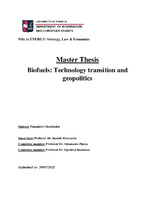| dc.description.abstractEN | In the current era there is a shift in the energy landscape that favors alternative technologies over fossil fuels. Biofuel is such a technology that is reclaiming importance with its major products being biodiesel and bioethanol. From the outset, the sector had a number of state stakeholders, but it has since grown notably in the last few decades. The choice of the production, the investment in this technology and the development rate for each state is different and is affected by a unique combination of geopolitical factors.
The aim of this thesis is to provide an overview of the complex geostrategic energy map formed in this transitional moment, by clarifying these factors and providing a qualitative study on how each of them affects the states. In order to accomplish this scope, a number of factors were identified in the literature, along with their geopolitical impact. Energy security was recognized as one of the most significant drivers for the states, as also their commitment to combating climate change. Another advantageous feature is rural and economic growth as well as the potential for a more sustainable development. On the other hand, factors that limit the growth of the sector include environmental concerns about the farming practices, deforestation to make more land available for biofuels, or competition with the food sector that results in higher food costs and food insecurity. In the case studies that followed, their impact on important producers – particularly Brazil, the EU, the US, China, Malaysia, Indonesia, and Thailand – was clarified. Countries such as US, which leads the production since 2006, and Brazil, the previous leader, have developed an industry that harvests in a balanced manner the majority of the advantages to support their climate strategy, their energy security, and their rural sector, while being little affected by negative impacts, as Brazil has some concerns about deforestation and food prices. Other states, have more direct priorities such as EU, which as the largest importer has taken a regulatory role, and China, with its enormous energy needs, utilize the sector primarily to strengthen their energy security before achieving their environmental goals. Finally, Malaysia, Indonesia and Thailand provide an excellent comparison. The first two have developed export strategies to support their economic and rural development, while Thailand has a completely introverted profile in this industry and is working to achieve a more environmentally conscious and sustainable development, risking losing its competitiveness in the process. Therefore, it is made clear that although all factors are generally applicable to all regions, they have a different specific gravity for each player. | el |



